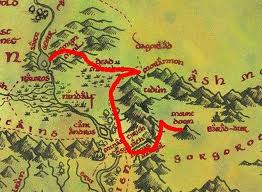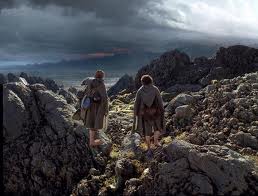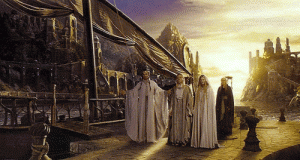1. Where you were when you started?
I began my journey much like Frodo in the Shire. I was aware that there was a much wider world out there, but I was pretty confident that I had the best of it, and I was okay right where I was.
I rated myself an 8/10 on the technology comfort scale. I am a self-taught computer user. Aren’t we all? I can figure out just about anything, even dabbling in Ubuntu, with a little time, determination, and a tech forum or two. I’ll admit, I was a little cocky. I understood that there are incredible possibilities for the use of ICT in the classroom, and I figured that as soon as I’m at a school with a decent set of computers, I would try it out for myself. No idea how or what I was going to “try”, but I figured that would also become more clear as the opportunity approached.
Then, as things progressed and we moved through the course content and discussions, I began to feel more like Frodo on his way to Mordor, a little shaky, a little unsure, confidence starting to wane.
I realized there was a whole heck of a lot I did not know. And, I’ve struggled with the sheer volume of possibility. Blogs, twitter, Diigo, oh my! I was overwhelmed. There is so much to choose from, and even if you wanted to, you could not use it all yourself, let alone in your classroom. And, a set of working computers became the least of my worries. But, this is a journey not a hotel stay. So, I had to keep moving.
As this course has progressed, it has become more and more clear to me that we cannot just use technology for the sake of using technology. It must be used not as an end in itself but as a means to an end, as a part of a process to help students understand and develop the new literacies that are shaping our world and our ability to be successful in that world. In my inquiry process, I came across a wonderful article by Henry Jenkins, on behalf of the MacArthur Foundation in the U.S., called Confronting the Challenges of Participatory Culture: Media Education for the 21st Century. In this article, participatory culture is described as a culture:
1.With relatively low barriers to artistic expression and civic engagement
2.With strong support for creating and sharing one’s creations with others
3.With some type of informal mentorship whereby what is known by the most experienced is passed along to novices
4.Where members believe that their contributions matter
5.Where members feel some degree of social connection with one another (at the least they care what other people think about what they have created).
(Jenkins, p. 7)
In Jenkins’ view, ”[w]e are moving away from a world in which some produce and many consume media, toward one in which everyone has a more active stake in the culture that is produced” (p. 10). As I said in my previous blog post on this topic, the “concept or ideal of a participatory culture relates directly to the cultural dimensions of the connected self. As I see it, that is the self that feels connected to and valued by those they are connected to in the classroom community to which they belong and in which they meaningful participate. Online participatory culture is the foundation of, inspiration for, practical reality of the connected self.” (me, Blog 1: Connecting Through Participation)
As my personal inquiry continued, I saw the disconnect between these wonderful ideals and the reality of everyday teaching. There are ministry, district, and union documents dedicated to ICT integration, but few schools are fortunate enough to have a working WiFi connection let alone regular access to a computer lab. If we are all so passionate about implementing these strategies, something has to change. And, by the end of week one, I realized that that change had to start with me. I have to be connected, literate, and motivated. To quote myself from an earlier post, “[i]t is my professional responsibility and my ethical duty to push forward, so I can prepare my students for the world they will enter. And, if I am going to be a leader in my school and professional communities, I need to be not only looking forward but actively moving forward with regards to ICT – resources, devices, and programs. I need to adapt.” (me, Blog 3: Me, Myself, and I)
2. Where you are now?
Like Frodo, I’ve woken up, the fog has cleared, and I’m grateful to be alive.
As the end of my journey comes ever nearer, and I approach the last week of class, I’m anticipating the final project with relief and sheer anxiety. I’ve come to terms with the fact that I cannot know or do everything, but I’m nervously excited about the possibilities of ICT, specifically (for me) the use of social media, in my classroom and future school library program. This week’s group inquiry project, led me to social media. I have long wanted to explore the possibilities of connecting students beyond the physical walls of the classroom. Students feel comfortable online, and they find online communication and connection meaningful (oftentimes inexplicably more so than face to face interaction), so it only makes sense to include this in my classroom practice. This is an opportunity not only to move beyond the confines of a physical classroom but a chance for students to collaborate, develop their identity and sense of responsibility and accountability as a digital citizen, and learn new literacies and skills that will help them find success.
3. Where you see yourself going?
Much like Frodo, I’ve got a bright future. I’m going to start small and dream big.
Our discussion of big ideas like sociocultural homeostasis and so forth, made me realize that, “[w]hen we are aware of the effect that the promotion of accepted norms is having on us and our view of what is possible, we are able to develop strategies that will allow us to move beyond expectation and help others to see the benefit of doing the same.” (me, Blog 3: Bringing It All Together) In line with that, yesterday’s inquiry into developing world libraries was particularly inspiring for me. I’m intrigued by the idea of having students create their own library collections. If libraries are going digital, why not get students involved in vetting, organizing, and curating collections of resources that are directly related to their area of inquiry. If they are doing a project on Louis Riel (because let’s face it, every student across Canada will at one time or another), they could gather government, academic, artistic, etc. resources on the man and the mystery and create something for other students just like them throughout Canada to use in their own research and inquiry. Students could also create individual or small group micro collections on their personal inquiry topic. And, they could use blogs, wikis, podcasts, twitter or Facebook to create, collaborate, and publicize their efforts. These collections could be linked to the online district catalogue or some future, yet undeveloped online library collection dedicated to these kinds of collections. Like searching outfits on
Polyvore or book lists on Goodreads, students could search, add to, and comment on a collection on Louis Riel. There are some amazing possibilities here!
The conclusion of it all? Now, all I need to do is convince my husband to buy me a MacBook.
Works Cited
Jenkins, Henry. “Confronting the Challenges of Participatory Culture: Media Education for the 21stCentury.” The John D. and Catherine T. MacArthur Foundation, n.d. Web. 4 July 2013. <http://fall2010compositions.pbworks.com/f/JENKINS_WHITE_PAPER.pdf>.






Inspiring! Thank you so much for the Jenkins link, gives us ‘raison d’etre’ for the existence/power of schools, libraries, teachers.
Hi Kristine,
I so enjoyed reading your synthesis this week… I LOVE your analogy between your journey and Frodo’s journey in the Lord of the Rings! Your comparisons and the photos you included made it so entertaining to read but, also, made your points very clear. Like you, in week one, I was feeling overwhelmed – there is so much, how can I do it all?!? Also, like you (and Frodo), in week two, I began to breath again. I think that had a lot to do with being able to develop a focus through our inquiry topics. Having time to meet and discuss your topic with a group who share a common goal is SO helpful and needed when you begin a new endeavor. It’s sounds like the collaborative process has been helpful for you too. You are right – “start small and dream big” and get your husband to get you that MacBook!
~ Michelle S.
Great presentation on Friday! I loved your LOTRs reference. I feel as if you are in a similar place to me in your thread of realization. I am starting to be more aware of the problem of using technology for technology’s sake. I think this is such an important realization. Once we can get away from “this is an interesting app” and start with “what do I want my students to learn?” we will make so much more progress.
I love the idea of students creating their own libraries. I think this would help them to become more active users of the knowledge available on the internet. It would be so empowering to have a page of your own resources, knowing that you had vetted, organized and selected them, while you are still in school.
Great work, Kristine! A very nice analogy of the journey. You have done an excellent job bringing the coursework together with your personal professional development, and thinking of ways to apply your learning into your future classroom. One thing you can do to support your journey after the course has ended is to make sure you form and sustain a personal learning network. The support from your personal learning network can give you the inspiration and motivation to face the challenges that lie ahead and draw strength from those not in your immediate environs. Without this kind of support, you are likely going to be ‘normalize’ by the existing culture in schools, which is probably not conducive to change, much less change involving digital technologies. Make friends, talk about what you hope to do, debrief, problem solve, and try again. Repeat. This is what we call life long learning.